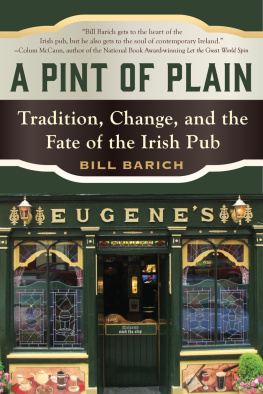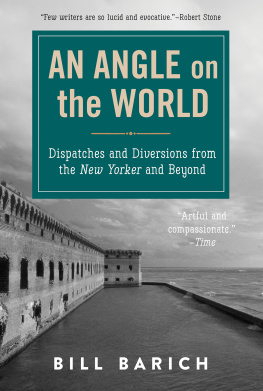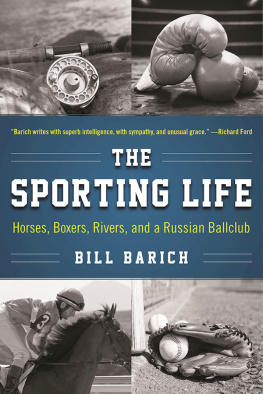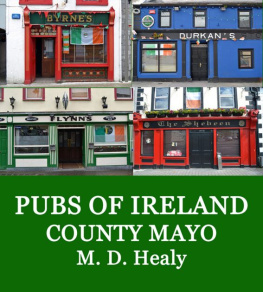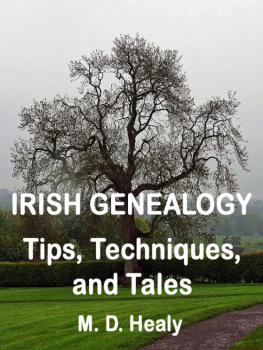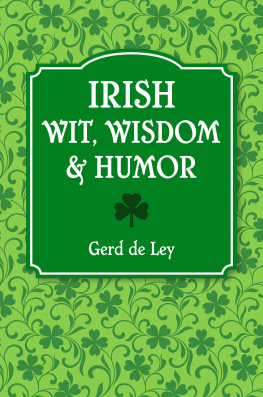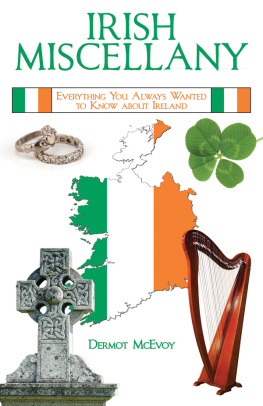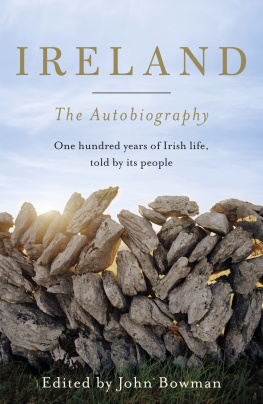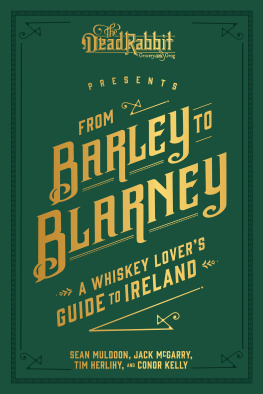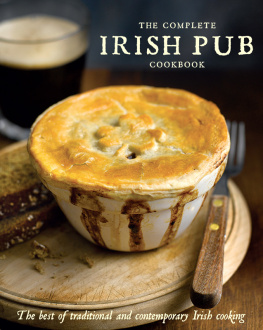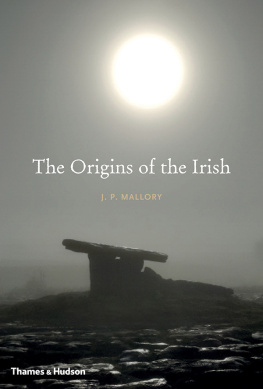
Praise for A Pint of Plain
Long ago, I figured out that I would simply read whatever Bill Barich writes.
Richard Ford
Bill Barich gets to the heart of the Irish pub, but he also gets to the soul of contemporary Ireland. At times its through the glass darklyas well it should beand this book is never without wit or style or charm. Barich has got to be one of the most writerly pub goers around.
Colum McCann, author of Zoli and This Side of Brightness
Nicely researched, intelligently written, his book is a fun read tinged with melancholy at the thought of time passing and things changing; appropriately Irish, I think.
Minneapolis Star Tribune
Driven by a need to experience a timeless tavern like the one in John Fords 1952 film The Quiet Mana place with a strong sense of community, where the art of conversation flourishesBarich travels throughout Ireland and is routinely disappointed... Barich weaves a never-ending stream of oddly engaging historical and literary references into every dead end.
New York Times
Profound and perceptive... The Irish didnt invent the pub, says Barich, but made it their own, one of those third spaces which is neither home nor workplace. Barich tells [his story] well, getting many characters to open up about their lives. In the process, he demolishes myths.
Irish Times
The American writer Bill Barich moved to Ranelagh, on Dublins south side, some time ago and set out to find the perfect Irish pub. A Pint of Plain is an engaging account of his quest and investigations... In no time at all, Barich comes face to face with the horror that makes up a great deal of pub life in the New Ireland: loud piped pop music; amplified traditional-music sessions; gigantic, bar-dominating TVs; inept bar staff.
Boston Globe
Most browsers will pick this up because they want to read about Irish pubs, but they will get much, much more than they expected. An excellent, however sneaky, addition to the literature of globalization.
Booklist
The author wins us over with his delicious sense of humor, stylish storytelling and abundant affection for Ireland and its people.
Kirkus Reviews

Copyright 2009, 2018 by Bill Barich
First edition published by Published by Walker Publishing Company, Inc., New York in 2009.
All rights reserved. No part of this book may be reproduced in any manner without the express written consent of the publisher, except in the case of brief excerpts in critical reviews or articles. All inquiries should be addressed to Skyhorse Publishing, 307 West 36th Street, 11th Floor, New York, NY 10018.
Skyhorse Publishing books may be purchased in bulk at special discounts for sales promotion, corporate gifts, fund-raising, or educational purposes. Special editions can also be created to specifications. For details, contact the Special Sales Department, Skyhorse Publishing, 307 West 36th Street, 11th Floor, New York, NY 10018 or .
Skyhorse and Skyhorse Publishing are registered trademarks of Skyhorse Publishing, Inc., a Delaware corporation.
Visit our website at www.skyhorsepublishing.com.
10 9 8 7 6 5 4 3 2 1
Library of Congress Cataloging-in-Publication Data is available on file.
Cover design by Tom Lau
Cover photo credit: Marcus Farrar
Print ISBN: 978-1-5107-3219-3
Ebook ISBN: 978-1-5107-3220-9
Printed in the United States of America.
For Imelda,
ever brighter
CONTENTS
Chapter 1
A PINT OF PLAIN
Y OU COULD SAY my fascination with the Irish pub began long before I ever set foot in Ireland. Like so many other romantics, I was steeped in the allure of the country through the work of its great writers and musicians, and I thought of it as an enchanted land beyond the grip of change. Id seen The Quiet Man far too many times, as well, and though I knew the movie was sentimental, filled with stereotypes, and deliberately unreala beautiful travelogue, John Ford called itI let it color my perceptions and felt compelled to start looking for a local as soon as I settled in Ranelagh, a neighborhood south of the Liffey, where I joined a lovely Dublin woman I had the good luck to meet on holiday in London and the good sense to follow home.
In my innocence, I assumed it would be easy to find a pub as devoutly Irish as Pat Cohans in Cong, the village in County Mayo where The Quiet Man was filmed in 1951. The city might not deliver a whitewashed cottage with a thatched roof, of course, but surely there would be many bars where a sense of tradition prevailed, and a genial but hardnosed publican kept the intrusions and distractions of the civilized world at bay to allow the art of conversation to flourish. Ireland has about twelve thousand pubs to choose from, after all. Moreover, Id been in training for the job most of my life, starting as a bored college student trapped in the snowbound wastes of upstate New York. Whenever my boredom peaked, I had one remedy only. I hitched a ride to Manhattan, wallowed in the beery charm of such iconic spots as McSorleys Old Ale House and P.J. Clarkes, and pretended Id fetched up on the Auld Sod.
The word Irish soon acquired a special meaning for me. It stood for talk, drink, laughter, fun, and a release from ordinary cares. I found the literary angle appealing, too. As a secret poet, I hoped the beer would lift me into the realm of Yeatsian glory. The lines I scribbled on bar napkins certainly seemed to improve with each pint, and before long I couldnt pass even a lowly Blarney Stone without feeling a twitch of inspiration. That may sound ridiculous, but the Irish pub, at least in its mythic form, encourages such fantasies. Its attraction is universal, and it cuts across cultural boundaries and crops up everywhere on earth with a frequency matched only by the unavoidable Chinese restaurant. A plate of dim sum doesnt conjure images as seductive as the Lake Isle of Innisfree, though. For that you need a jar of the black stuff and Van Morrison on your iPod.
In my travels over the years, I gathered further evidence of the pubs enduring popularity. At an Irish bar in the Caribbean, I drank rum with a noted cricketer and discussed C. L. R. James, the sports premier author, and at another in Florence I joined some fashionable Italians, all carrying shopping bags from the boutiques on Via Tornabuoni, in a fractured sing-along of Danny Boy. The Fountain, once my local in Islington, North London, morphed into Filthy McNastys, rumored to be a favorite pit stop of the Pogues Shane MacGowan, an endorsement of Irishness money couldnt buy. I sampled stout in Malaga and Vancouver, Paris and Guadalajara, and became convinced that even if I journeyed to the far reaches of the globe, to So Tom or the Tro-briand Islands, Id catch a glimpse of the familiar Guinness logo on the horizon.
My experience was so vast I considered myself a modest expert on the subject when I made the move to Dublin. It never occurred to me that the Clancys and OMalleys Id visited elsewhere were mere imitations based on an ideal, or variations on a theme. A quick tour of the city taught me that the homegrown pubs exist in a bewildering array of styles now, from the architectural splendor of Doheny & Nesbitt to the grottolike confines of the Dawson Lounge, down a tricky staircase and into a cellar with only 350 square feet of space. Caf en Seine was a temple of baroque overkill furnished with a hodge-podge of statuary, ferns, and sconces, while John Kehoe looked so unadorned that it scoffed at the very notion of decoration. From friends I heard about gay pubs, Polish and Nigerian pubs, early houses that opened at seven, and illicit after-hours pubs that supposedly never closed, but I stuck to my guns.
Next page
